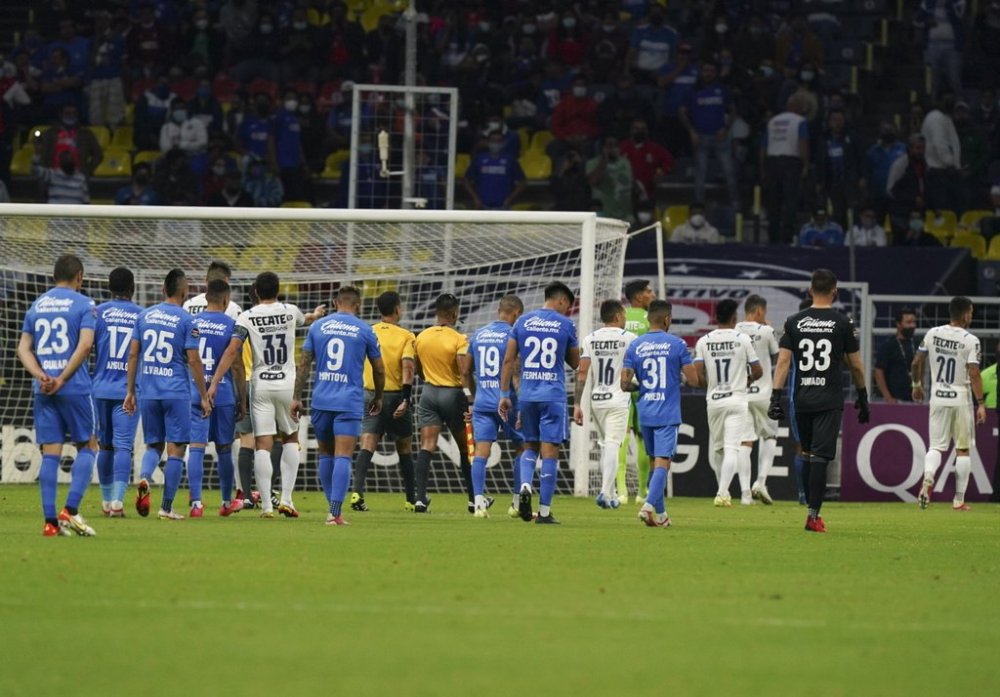Activists call on Mexican soccer fans to end homophobic chant ahead of 2026 World Cup
Advertisement
Read this article for free:
or
Already have an account? Log in here »
To continue reading, please subscribe:
Monthly Digital Subscription
$0 for the first 4 weeks*
- Enjoy unlimited reading on winnipegfreepress.com
- Read the E-Edition, our digital replica newspaper
- Access News Break, our award-winning app
- Play interactive puzzles
*No charge for 4 weeks then price increases to the regular rate of $19.00 plus GST every four weeks. Offer available to new and qualified returning subscribers only. Cancel any time.
Monthly Digital Subscription
$4.75/week*
- Enjoy unlimited reading on winnipegfreepress.com
- Read the E-Edition, our digital replica newspaper
- Access News Break, our award-winning app
- Play interactive puzzles
*Billed as $19 plus GST every four weeks. Cancel any time.
To continue reading, please subscribe:
Add Free Press access to your Brandon Sun subscription for only an additional
$1 for the first 4 weeks*
*Your next subscription payment will increase by $1.00 and you will be charged $16.99 plus GST for four weeks. After four weeks, your payment will increase to $23.99 plus GST every four weeks.
Read unlimited articles for free today:
or
Already have an account? Log in here »
MEXICO CITY (AP) — Frustrated that Mexico’s soccer federation has failed to stop a homophobic chant heard during national team matches, LGBTQ+ activists are appealing directly to local fans to end the offensive habit before next summer’s World Cup.
The chant, a one-word slur that literally means male prostitute in Spanish, went viral in the 2014 World Cup in Brazil and the subsequent fines — including 100,000 Swiss francs (then $114,000) for two incidents during the 2022 World Cup in Qatar — had little impact.
“Those fines have been for nothing. And what has the federation done? Not much. And what it has done is useless,” said Andoni Bello an LGBTQ+ activist and critic of the chant who played for Mexico in amateur soccer tournaments organized by the International Gay and Lesbian Football Association.

The United States, Canada and Mexico are hosting the 2026 World Cup starting next June 11.
Mexico was awarded 13 matches in three cities — Monterrey, Mexico City and Guadalajara, the capital of the state of Jalisco where the chant was first heard during a 2004 Olympic qualifier between Mexico and the U.S. Afterward, it spread to stadiums across the country with fans of Guadalajara soccer club Atlas.
The slur usually occurs when the opposing goalkeeper takes a goal kick and it is more frequent when the Mexican team is losing the match.
“I’m concerned about the violence expressed in stadiums, which is invisible and anonymous,” Bello added. “This normalized violence perpetuates homophobic hate crimes in this country. It seems very drastic, but it’s real. If we think nothing’s happening, we’re perpetuating it.”
Initially, federation officials argued that the chant wasn’t aimed at gays and that the word had different connotations in Mexican culture, but then they changed the approach by launching social campaigns that did not succeed. Now, they simply ask fans before matches not to do it.
In 2022, the federation also threatened fans shouting the slur at games with five-year stadium bans but they did not enforce it.
“The federation wanted to find other meanings for it. It has no other meanings; it’s a homophobic one,” Bello said. “We call on sponsors, institutions, players, teams, and fans to change the way they view people and their sexuality.”
Bello has teamed with Calma Comunidad, a non-profit organization that seeks to provide sexual education, and the National Council to Prevent Discrimination, a decentralized agency of Mexico’s government that tries to eliminate discrimination in the country. They will approach top-tier teams and their fan clubs to try to do workshops before the World Cup.
“It’s a great opportunity to generate these small, big changes. Here we are resisting to generate or promote those changes,” said David Moncada, who works for Calma Comunidad.
Bello added that neither he, nor the other organizations are asking fans to spot having fun at the stadium, just to avoid doing it while using a homophobic slur.
“I want my team to win, and I want the other team to feel the pressure of the stadium. Of course, I’m going to yell and pressure them to make mistakes, but I don’t need to make homophobic comments,” Bello added. “It’s not necessary.”
___
AP soccer: https://apnews.com/hub/soccer


